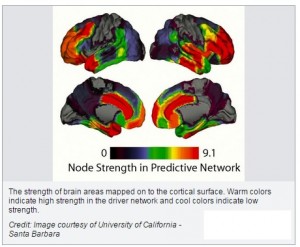The Brain Game: How Decreased Neural Activity May Help You Learn Faster
[Source: Science Daily]

Why are some people able to master a new skill quickly while others require extra time or practice? That was the question posed by UC Santa Barbara’s Scott Grafton and colleagues at the University of Pennsylvania and Johns Hopkins University.
To find the answer, the team designed a study that measured the connections between different brain regions while participants learned to play a simple game.
The researchers discovered that the neural activity in the quickest learners was different from that of the slowest. Their analysis provides new insight into what happens in the brain during the learning process and sheds light on the role of interactions between different regions. The findings, which appear online today in Nature Neuroscience, suggest that recruiting unnecessary parts of the brain for a given task — similar to overthinking the problem — plays a critical role in this important difference.
Read the Rest of this Article on Science Daily
The researchers discovered that the neural activity in the quickest learners was different from that of the slowest. Their analysis provides new insight into what happens in the brain during the learning process and sheds light on the role of interactions between different regions. The findings, which appear online today in Nature Neuroscience, suggest that recruiting unnecessary parts of the brain for a given task — similar to overthinking the problem — plays a critical role in this important difference.
Read the Rest of this Article on Science Daily
PediaStaff is Hiring!
All JobsPediaStaff hires pediatric and school-based professionals nationwide for contract assignments of 2 to 12 months. We also help clinics, hospitals, schools, and home health agencies to find and hire these professionals directly. We work with Speech-Language Pathologists, Occupational and Physical Therapists, School Psychologists, and others in pediatric therapy and education.
